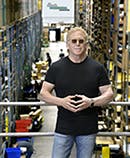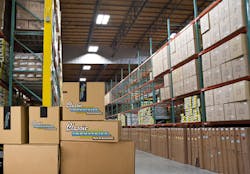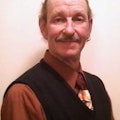A classic story of success is achieved by strong muscle car advocate and purveyor of restoration parts
As a young man enthralled with his prized 1967 creampuff RS Camaro, Jeff Leonard instinctively knew that marketing muscle car parts was going to become a viable business at some point – he just didn’t know when. But he remained certain that the concept held strong potential for a career.
“I took my passion for Camaros and my mail order experience and combined them into a business,” he says, reflecting on the founding of Classic Industries in 1976. From a hardscrabble yet determined beginning Leonard’s entrepreneurial drive has culminated to encompass several additional automotive-oriented enterprises, such as OER (Original Equipment Reproduction), the California Mustang Co. and GMCI (General Marketing Capital Inc.).
After graduating from high school, Leonard had had gone to work for a mail-order electronics company in the Detroit area. He was impressed with the mail-order business, learning about warehousing, shipping, sales and an assortment of other essentials necessary for achieving success.
Leonard also knew that working for someone else wasn’t going to afford the same opportunities as working for himself and being his own boss, so he made plans to move to California with a dream of starting a business of his own.
“The experience I obtained working at the mail order company gave me a certain level of confidence, but I still needed a product to sell,” he recalls. “Eventually I realized that the Camaro parts business was a good option,” given a series of difficulties he encountered while trying to find components to outfit his own custom ride – all the while commiserating with fellow enthusiasts equally frustrated over the weak availability of muscle car parts.
Leonard shares the story of going to friends and telling them of his idea to get into the classic car parts business. “Many of the people I talked to didn't think it was a good idea,” he says. “One comment was, ‘People don't keep cars anymore; they replace them with new ones.’ I went to at least a dozen friends and asked for $10,000 in exchange for a 50 percent share of my newly formed company. Nobody bought into the idea, so I decided to go it alone.”
Leonard attempted to attract investors, but not knowing how to go about it rendered zero results. He was 21 years old, had no credit and didn't own a house. He went to the local bank and asked for a $10,000 loan. The bank turned him down because he didn't have any collateral.
Instead of giving up, though, Leonard returned to the bank and asked for $20,000. The bank manager reminded him he couldn't approve a loan for $10,000, and was confused as to why he would come back asking for double that amount. Replied Leonard to the manager: “If the bank loans me $20,000, the bank could hold $10,000 for collateral and loan me the other $10,000. I would then make payments on the $20,000.”
Impressed with this simple but creative bit of financing the bank manager approved the loan, allowing Leonard to continue building his company. “If I didn't get that loan, I probably wouldn't be in business today. I was $10,000 in debt and had checks to cover, so the loan is what saved the business. I'm very grateful to that bank manager.”
An expensive proposition
Evolving from its modest start, selling smaller hard-to-find Camaro parts out of an unassuming roadside shop in Palm Springs, California, Classic Industries was able to eventually relocate to the heart of Orange County in the coastal city of Huntington Beach. An extensive line of catalogs now includes Buick Regal, Camaro and Mopar along with additional nameplates.
Classic owns the license for Yenko supercars, and Leonard has kept the limited-edition brand alive by selling and servicing souped-up customs such as the 800-horsepower Yenko Chevy Corvette Grand Sport.
The vehicles originated from Yenko Chevrolet of Canonsburg, Pa. in the 1960s, and they remain highly collectable with new models still being released in limited runs of just 50 cars.
Making a push into Spanish-speaking markets, the company is currently recruiting bilingual staffers and advancing efforts to better connect with this ethnic group at both the domestic and international levels.
For considering the complete Classic Industries merchandise lineup, “Our retail showroom is open to the public six days per week, and we can also be contacted via phone or email for domestic or international orders.”
The headquarters also contains corporate offices and a parts production line, plus a sizable call center, shipping facility and multiple warehouses housing “the largest inventory of parts and accessories in the restoration and performance industry,” according to Leonard.
Making decisions on which products to produce can be an involved process. An obvious factor is researching the popularity of a given model and delving into the original assembly line production figures.
“Reproducing parts is an expensive proposition, so being able to determine the potential sales or revenue of a particular product is important. Taking the production numbers and the popularity of the car into consideration is a determining factor in deciding what parts to produce,” says Leonard.
“The more popular the car is, the better chance of success there is in selling the parts. Once we’ve determined that a particular part has enough demand to reproduce, original samples are gathered and the reverse engineering process begins.”
When researching the pro and con ramifications of opening a new division or establishing a new company, some of the main issues that he ponders include: Can the venture be profitable? Does it make business sense? Is there a market for the product or idea?
“These are questions anyone in business might ask themselves,” Leonard points out. “Once you have an idea, it's easy enough to investigate and determine if it has potential. This is the process that takes place before starting off on a new venture.”
A vigorous car show and convention schedule is developed and fine-tuned through a series of meetings among the company’s marketing department concerning the various events to attend. “If a particular trade show targets the audience that may be interested in the products we offer, it would be considered as a place to exhibit,” he says.
In addition to the robust in-person presence the business is promoted through media channels such as print advertising, television commercials, product placement on TV shows, digital ad campaigns, social media, and the direct mailing of catalogs and other promotional materials.
“Marketing your company is just as important as marketing your products,” Leonard emphasizes. “We don't take chances -- we make sure our customers know who we are, what we offer and where to find us."
About the Author
James Guyette
James E. Guyette is a long-time contributing editor to Aftermarket Business World, ABRN and Motor Age magazines.



